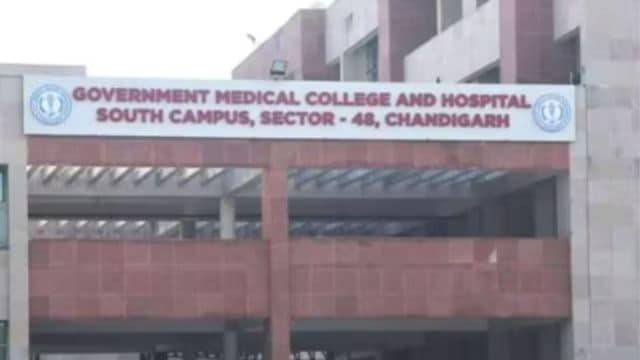GMCH-32: Newly constructed block to be inaugurated on Aug 8, to decongest gynaecology dept
In the hospital’s history, the A Block, where 24-hour emergency services are provided to patients, was the first to become functional, and since 1996, there has been no renovation of this block.
 The gynaecology department of the hospital has 100 beds, with 10 beds added way back in 2017. (Express File Photo)
The gynaecology department of the hospital has 100 beds, with 10 beds added way back in 2017. (Express File Photo)The newly constructed 283-bed Emergency-cum-Trauma Block at GMCH-32 is all set to be inaugurated on August 8, to coincide with the 11th convocation, promising to reduce overload on the existing emergency units in the city, improve patient care and ensure better utilisation of resources.
In the hospital’s history, the A Block, where 24-hour emergency services are provided to patients, was the first to become functional, and since 1996, there has been no renovation of this block. “With the new state-of-the-art trauma block ready for patients, the first step will be to renovate the area, with the engineering and fire safety departments already in action to ensure the latest facilities, amenities and safety.
Once this is complete, we will start the process of decongesting our gynaecology department, which also comprises the labour room, and witnesses patients from across the region, including the large migrant population that we have. We will be utilising this space for the expansion of the department, and also add more beds to ease rush. We are making efforts to provide more speciality and super-speciality services. The process of space creation is a dynamic one,” said Prof A K Attri, Director-Principal, GMCH-32.
The gynaecology department of the hospital has 100 beds, with 10 beds added way back in 2017. The number of patients in the gynaecology department is very high, and despite the increase in beds, there are not enough beds for pregnant women. More than 5,000 women deliver in GMCH every year, and when the number of cases is higher, two women have to be adjusted on one bed, with the occupancy rate almost 200 per cent. The hospital receives delivery cases from Chandigarh, Punjab, Haryana, Himachal, Uttarakhand, UP, and despite the shortage of beds, the effort is to provide treatment. As per doctors, the gynaecology department of GMCH-32 has the highest number of deliveries, followed by GMSH-16 and then PGI.
Both PGI and GMCH-32 will have exclusive Mother and Child Centres, with work on the project of GMCH-32 having started in 2018, but was delayed due to COVID and has now restarted. With a budget of about Rs 73 crore, the centre, which will be open in about two years, will have two basements and four floors and have a facility of 251 beds, with the latest facilities and services under one roof. Dr Attri said it will decrease infant and mother mortality rate.
PGI’s Advanced Mother and Child Care Centre, where work is in full swing and may be inaugurated at the end of this year, will be equipped with the latest technologies and offer world-class facilities in both maternal and neonatal care. A human milk bank, advanced infertility treatment, robotic surgery, critical care obstetrics, high-risk maternity unit, foetal medicine unit, pre-implantation genetic diagnosis, prenatal diagnosis, and reproductive endocrinology unit will be part of the centre.
Here, there will be a modern developmentally supportive and family-centred level IV NICU designed as per current International NICU design specifications, a family-centred Kangaroo Mother Care ward, and a comprehensive high-risk follow-up programme.
A long-needed facility, the Advanced Paediatric Centre at GMSH-16 was inaugurated last year. The 32-bedded facility offers state-of-the-art specialised care, featuring a 12-bedded hybrid ICU unit comprising ventilator beds and high-dependency unit beds.
The centre includes 20 oxygen-supported beds and features ECG, echocardiography, and ultrasonography, all under one roof, so that parents don’t have to go anywhere for these tests and their children receive the best care. There are 24-hour services like blood transfusion, sample collection, nebulisation etc, for critical patients, and this advanced centre has eased the burden on PGI.












